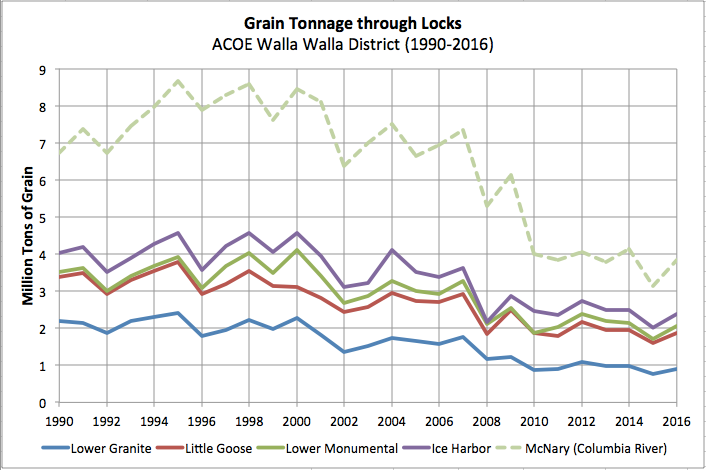forum
library
tutorial
contact

New TPP Deal Puts U.S. Wheat
Farmers at Tariff Disadvantage
by Matthew Weaver
Capital Press, January 23, 2018
|
the film forum library tutorial contact |

|
New TPP Deal Puts U.S. Wheat
by Matthew Weaver
|
A new Trans-Pacific Partnership deal would put U.S. wheat farmers at a $200 million disadvantage each year,
according to the U.S. Wheat Associates and National Association of Wheat Growers, in a joint statement.
 U.S. wheat organizations say overseas demand for their crop is at risk now that the remaining 11 members of the Trans-Pacific Partnership have concluded talks on a revised deal excluding the U.S.
U.S. wheat organizations say overseas demand for their crop is at risk now that the remaining 11 members of the Trans-Pacific Partnership have concluded talks on a revised deal excluding the U.S.
"Exactly one year ago, President Trump announced the United States would pull out of the TPP," said Ben Conner, director of policy for U.S. Wheat Associates, in a press release. "The announcement today that the 11 remaining TPP members have concluded talks on a revised deal without us sends another discouraging signal to our long-time wheat importing customers in Japan."
Japan imports an average of 3.1 million metric tons of U.S. wheat every year, according to U.S. Wheat and the National Association of Wheat Growers. That was about 49 percent of Japan's food wheat imports in 2016, according to the USDA. Canada supplied 34 percent and Australia 17 percent that year.
After full implementation of the new TPP, Japan's import tariffs on Canadian and Australian wheat will drop by about $65 per ton while the tariff on U.S. wheat will remain.
"That would put U.S. wheat producers at a total price disadvantage of more than $200 million per year from TPP alone," Conner said. "As the agricultural community warned when the president made the announcement, withdrawing from TPP was shortsighted and unnecessary, and now U.S. wheat farmers could take the hit."
"It is a very bad deal for our farm families and communities, for the U.S. to not be in TPP," said Glen Squires, Washington Grain Commission CEO. "There is nothing positive about turning our backs and rejecting beneficial trade with so many customers and trading partners, particularly Japan, who has often been the number one market for our wheat and has always been the number one market for club wheat."
Squires is part of a group of Northwest and national wheat industry leaders who have been in Japan meeting with government officials and flour millers. Also in the group are Mike Miller, Washington grain commissioner and chairman of U.S. Wheat; Damon Filan, Washington grain commissioner and manager of Tri-Cities Grain; Michelle Hennings, executive director of the Washington Association of Wheat Growers; Oregon Wheat Commissioners Darren Padget and Walter Powell; Idaho Wheat Commissioner Bill Flory; and Vince Peterson, president of U.S. Wheat, and Mark Fowler, vice president of overseas operations for U.S. Wheat.
"The Japanese message is simple. The U.S. should be part of TPP," Squires said in an email. "It is devastating to U.S. agriculture, and wheat in particular, to not join TPP. Japan is not interested in a bilateral agreement."
"As expected, the remaining members of TPP are moving forward without the United States," stated Gordon Stoner, NAWG president and an Outlook, Mont., wheat farmer. "If nothing else, this announcement should serve as a rallying cry for farmers, ranchers and dairy producers calling for the new trade deals we were promised when the president walked away from TPP. The heat needs to be turned up on the administration and on trade negotiations with Japan. An already stressed agriculture sector needs the benefit of fair and free trade now."
"We are working to ensure our elected officials (both state and national) and those in the administration, including our trade representatives, know how important this market is to our state and region," Squires said. "We don't want to lose this important Japanese market. If so, the hurt will be felt in communities not only across Washington, but across the region and into the upper Midwest."
Other TPP countries with rapidly growing demand for imported wheat include Mexico, Vietnam, Malaysia, Chile and Peru. Singapore, Brunei and New Zealand are the remaining TPP partners.
Related Pages:
Wheat Industry Weighs Next Moves on TPP by Matthew Weaver, Capital Press, 2/3/18
U.S. Must Rejoin TPP, Ag Policy Expert Says by Matthew Weaver, Capital Press, 1/31/18
International Grain Prices More Complex Than One Deal by Lee Rozen, The Daily News, 1/27/18
learn more on topics covered in the film
see the video
read the script
learn the songs
discussion forum
